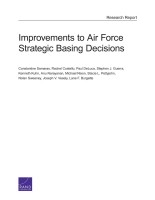| 来源类型 | Research Reports
|
| 规范类型 | 报告
|
| DOI | https://doi.org/10.7249/RR1297
|
| ISBN | 9780833092052
|
| 来源ID | RR-1297-AF
|
| Improvements to Air Force Strategic Basing Decisions |
| Constantine Samaras; Rachel Costello; Paul DeLuca; Stephen J. Guerra; Kenneth Kuhn; Anu Narayanan; Michael Nixon; Stacie L. Pettyjohn; Nolan Sweeney; Joseph Vesely; et al.
|
| 发表日期 | 2016
|
| 出版年 | 2016
|
| 页码 | 116
|
| 语种 | 英语
|
| 结论 |
The Relative Influence of Basing Criteria- The Air Force makes basing decisions according to criteria that can generally be categorized into four categories: base attributes that affect the mission, whether the base has the current capacity to accommodate the proposed basing action, cost criteria that generally reflect regional economic factors, and environmental conditions that might inhibit accommodating the proposed mission.
- The current basing process is designed so that installations with high mission scores are advanced toward site selection, but capacity scores largely influence the final candidate list.
Data Quality- Data used to make basing decisions are derived from authoritative sources.
- Sources used to answer data call questions are consistent.
- The auditability of underlying data used in the basing action process is weak. It is challenging to trace specific sources used to answer questions.
- A majority of "data errors" may be unrelated to data quality and result from the data collection process or human error, or potentially both.
Role of Strategy in Basing Decisions- The Air Force and the U.S. government choose and maintain overseas bases principally for their strategic and diplomatic value, whereas decisions about domestic bases are driven by other criteria, such as access to training ranges, utilizing existing capacity, and satisfying political considerations.
- The current domestic basing process does not include a portfolio-wide assessment of individual decisions or explicitly incorporate broader Air Force strategic concerns. The lack of strategic input is a post–Cold War phenomenon.
|
| 摘要 |
- The Air Force should improve the auditability of the data used in basing decisions to allow for more efficient review by Headquarters Air Force. The combination of improved auditability and increased review should decrease the potential for human error in the basing decisionmaking process.
- The Air Force should institute a process in which bases are initially screened for a basing action based on mission criteria, and then this smaller list of candidates is assessed on other criteria. This would save time and costs compared with the current process, in which all bases under consideration must provide data on all criteria.
|
| 主题 | Air Defense
; Air Warfare
; Base Realignment and Closure
; Civil-Military Relations
; Defense Infrastructure
; United States Air Force
|
| URL | https://www.rand.org/pubs/research_reports/RR1297.html
|
| 来源智库 | RAND Corporation (United States)
|
| 引用统计 |
|
| 资源类型 | 智库出版物
|
| 条目标识符 | http://119.78.100.153/handle/2XGU8XDN/108217
|
推荐引用方式
GB/T 7714 |
Constantine Samaras,Rachel Costello,Paul DeLuca,et al. Improvements to Air Force Strategic Basing Decisions. 2016.
|
|
文件名:
|
x1495316193993.jpg
|
|
格式:
|
JPEG
|

|
文件名:
|
RAND_RR1297.pdf
|
|
格式:
|
Adobe PDF
|
除非特别说明,本系统中所有内容都受版权保护,并保留所有权利。